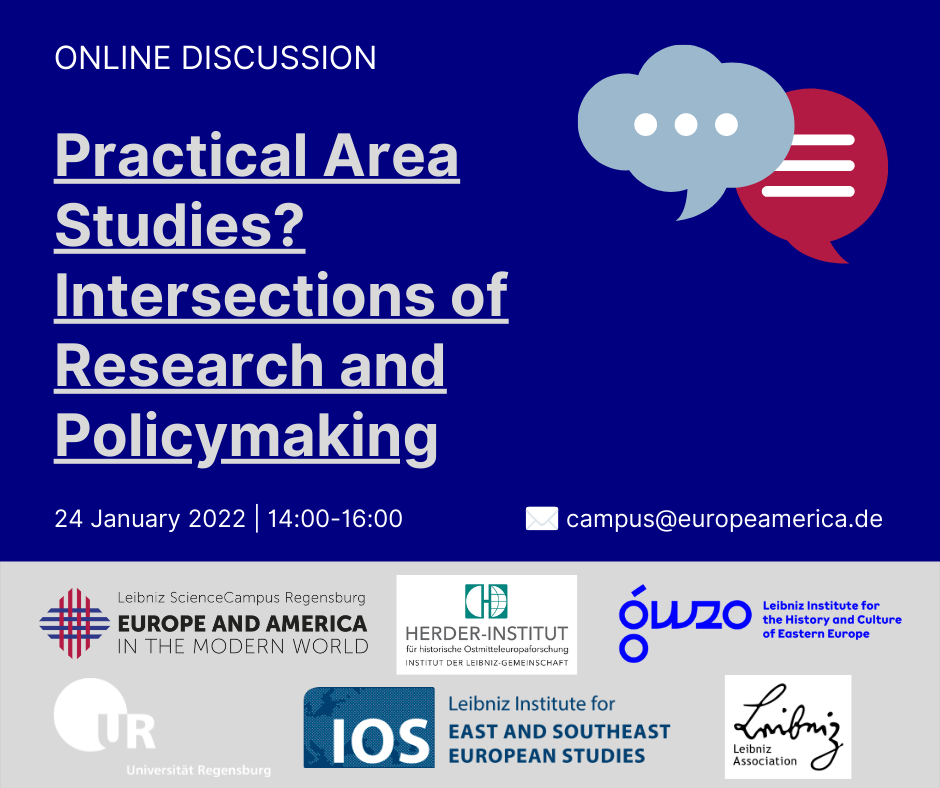Practical Area Studies? Intersections of Research and Policymaking
Area Studies under Discussion is a regular series of debates on current themes in area studies organized by the Leibniz ScienceCampus Europe and America in Regensburg, the Herder Institute for Historical Research on East Central Europe in Marburg, and the Leibniz Institute for the History and Culture of Eastern Europe (GWZO) in Leipzig.
The fifth session of Area Studies under Discussion will take place online via Zoom on Monday, 24 January, 14:00-16:00. https://uni-regensburg.zoom.us/j/63655473818 | Meeting ID: 636 5547 3818
Area studies has traditionally played a role in policymaking and policy analysis, acting as a bridge between academia and foreign policy, including international trade and security as well as soft power measures. By training diplomats, merchants and military, area studies in the nineteenth and twentieth centuries contributed and disseminated knowledge of regions shaped by colonial conquest, military conflict and economic interests of European imperial powers. The political role of area studies was especially accentuated during the Cold War and in relation to the decolonization processes emerging in the “Global South”.
Today, in the post-Cold War era, the field of area studies is still connected to policymaking, with researchers briefing politicians, think tanks and the media on conflicts and conflict prevention, political developments, and social trends in their regions of expertise. Established formats including field missions, policy papers and policy briefs, opinion pieces, and face-to-face discussions remain important, while other formats that crossover with public outreach efforts like exhibitions, podcasts, blogs or social media posts, indicate the increasing relevance in engaging with and informing public opinion.
This discussion looks to create a dialogue involving people with roles positioned at the intersections of scholarship and research infrastructure, government bodies, international diplomacy, and civil society. They will consider different aspects of the relationship between research communication and policymaking today. The encounter also looks to address where misunderstandings and miscommunication occurs. How do academic area studies contribute to current political debates, and are they heard? How can relations be formed with think tanks, NGOs, and policymakers that are mutually beneficial? How can current formats be adapted to better meet the needs of society today? Do funding structures enable research with partners in international regions, promoting genuine exchanges and reciprocity, or do they favour research about them? And how can research communication avoid reproducing existing inequalities and regional asymmetries when it comes to informing politics, scholarship and research communication?
Participants:
- Prof. Dr. Margarita Balmaceda - School of Diplomacy and International Relations, Seton Hall University, NJ
- Christian Kobsda – Political consultant and coordinator of the Leibniz im Bundestag program, Leibniz Association, Berlin
- Dr. Astrid Sahm – The German Institute for International and Security Affairs (SWP), Berlin; Head of the International Center for Education and Exchange (IBB)
- Prof. Dr. Stefan Troebst – Leibniz Institute for the History and Culture of Eastern Europe (GWZO) and University of Leipzig; Honorary Consul of Kosovo
Discussion chair:
Dr. Fabian Burkhardt, IOS Regensburg

